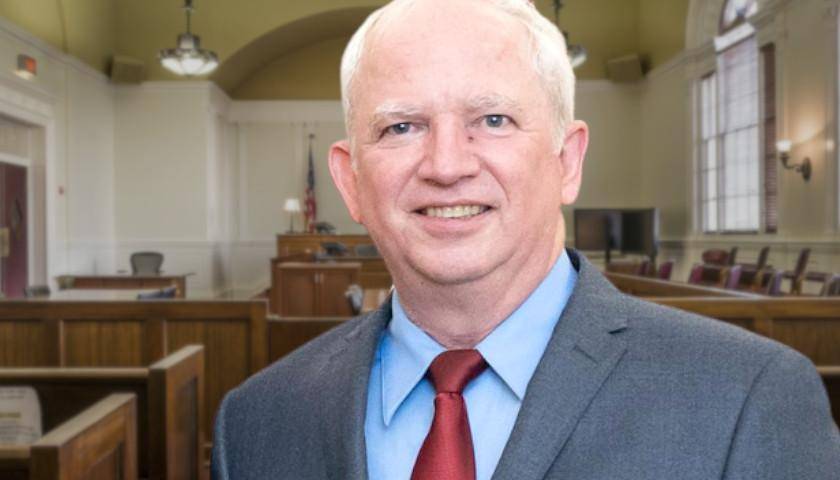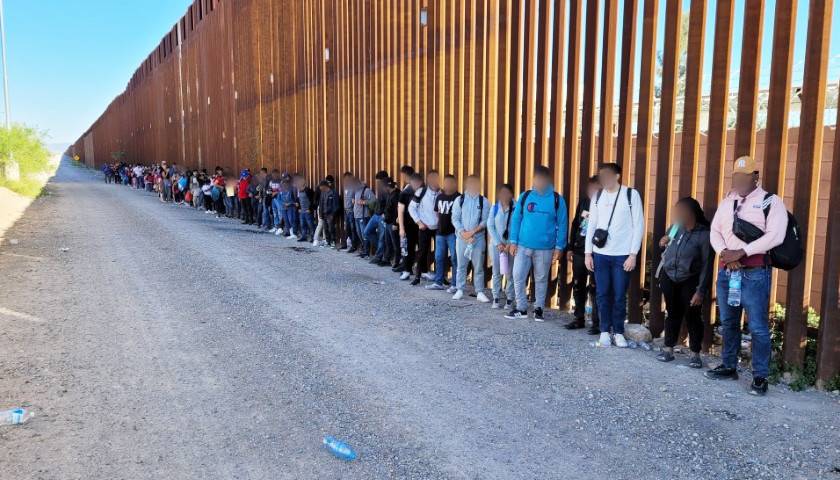The disbarment trial of Donald Trump’s former attorney and constitutional legal scholar, John Eastman, ended November 3, with closing written arguments submitted last Friday. California Bar Disciplinary Judge Yvette Roland announced at the end of the trial that she found Eastman culpable, and will issue a written decision soon indicating whether she will fully disbar him or give a lesser punishment. Eastman is expected to appeal any negative decision.
The State Bar of California charged Eastman (pictured above) with violating his oath as an attorney to uphold the Constitution by providing the Trump administration with options to handle the 2020 election illegalities, including a couple of scenarios where former Vice President Mike Pence would delay or reject acceptance of the electoral slates from disputed states.
The charges asserted, “Dr. Eastman engag[ed] in a course of conduct … to plan, promote, execute, and assist Trump in executing a strategy for Trump to overturn the legitimate results of the election by obstructing the count of electoral votes of certain states, which strategy Dr. Eastman knew, or was grossly negligent in not knowing, was not supported by either the facts or law.” The California Bar stated that “no reasonable attorney” would have relied on the evidence of election illegalities, so Eastman’s legal advice was “frivolous.”
Eastman’s post-hearing brief said, “The premise of the State Bar’s charge against Dr. Eastman, which rests on these and other similar statements, has an Orwellian cast to it: the government has spoken, and if you disagree, then you must be lying. Two plus two equals five, after all, and if the government says so, you must not only repeat the lie, but you must come to believe it as well. This is authoritarianism, not republicanism.”
It added, “Allegations of illegal conduct and fraud in elections have become a staple of our political contests for decades, including 2000 and 2016, but only in the wake of the 2020 election has any attempt been made to criminalize or to subject to bar disciplinary process the lawyers who made such allegations. What we are witnessing is an unprecedented use — and abuse — of the legal system to silence the views of political opponents.”
Case law established that frivolous means “‘both (1) baseless and (2) made without reasonable and competent inquiry,” the brief said.
It laid out how Pence addressed this matter in the January 6, 2021, letter he prepared with his counsel, Greg Jacob, and sent to Congress acknowledging “[s]ignificant allegations of voting irregularities and numerous instances of officials setting aside state election law.” Secondly, “These concerns were expressed in the reports of illegality and fraud that more than 100 state legislators sent to Washington, D.C., before the count took place.” Finally, numerous “non-legislative actors,” including various state and local election officials, engaged in “abrogating, disregarding, or modifying state election laws in several swing states potentially violated the Constitution and profoundly impacted the 2020 election.”
The brief went over Eastman’s research into the election irregularities and how these irregularities changed enough votes to affect the presidential race in several states. It cited testimony during the trial by his witnesses, including attorney Kurt Olsen, who was also involved in the 2020 election litigation.
The brief refuted some of the California Bar’s charges. “The NDC alleges that Dr. Eastman made false and misleading statements that ‘dead people had voted,’ yet the NDC goes on to believe this same accusation by acknowledging evidence confirming that votes were, in fact, cast on behalf of deceased individuals, including ‘only’ 1,616 such votes in Michigan.”
The standard of proof required to find Eastman guilty is clear and convincing evidence, which means “reasonable doubts about culpability must be resolved in favor of Dr. Eastman,” the brief stated, citing case law.
The law provides that to be guilty of not supporting the Constitution, Section 6068(a) of the California Bar’s rules, “the State Bar must allege and prove that the attorney actually violated another specific law.” However, “[I]t is unclear what specific law the State Bar is asserting Dr. Eastman violated,” the brief said.
Eastman was accused of misleading the court under Section 6068(d). To find an attorney guilty under that section, “the attorney must conceal material facts or make explicit false statements” and must have “intent to mislead; this cannot be proven by circumstantial evidence.” Eastman represented Trump in a Motion to Intervene in the 2020 election challenge lawsuit Texas v. Pennsylvania. The brief pointed out that six other states sought to intervene, and 12 states, hundreds of state legislators, and members of Congress filed amicus curiae briefs in support.
The brief contended that “the Bar has failed to establish that he knew the factual assertions were false.” Eastman was allowed to rely on the opinions of experts who found violations of election law, the brief argued. “Dr. Eastman’s reliance was reasonable under the circumstances, especially because of the technical nature of the issues assessed, and that the experts maintained their opinions when presented with contrary opinions of opposing experts.”
The California Bar accused Eastman of “dishonesty, moral turpitude, or corruption” under Section 6106. The brief responded, “[T]here is no evidence, much less clear and convincing evidence, which would support a conclusion that Dr. Eastman at any time acted with ‘baseness, vileness or depravity’ or that he intended to mislead anyone. Dr. Eastman’s unrebutted (and unrebuttable) testimony showed that his conduct was made entirely in good faith, based upon his (reasonable) understanding of the facts known to him at the time.”
It added, “The very foundation of our adversarial legal system requires that a lawyer representing one side in such a dispute zealously advocate for his client’s position.”
The brief asserted that the First Amendment protected Eastman’s advice, since case law has established that it includes expression from attorneys. “Most importantly, the First Amendment protects even allegedly false statements,” The brief went on. “It is well-established that ‘[d]isciplinary rules governing the legal profession cannot punish activity protected by the First Amendment.’”
Additionally, “The State Bar has not shown by clear and convincing evidence substantial likelihood that Dr. Eastman’s statements would materially prejudice any court proceeding. Indeed, it has offered no evidence on that point at all.” The brief said that for Eastman to “lose First Amendment protection for his statements, whether true or false, the State Bar has the burden of proving by clear and convincing evidence that (1) Dr. Eastman intended to incite lawless action; and (2) Dr. Eastman’s statements were actually likely to produce imminent lawless action.”
The brief said Eastman’s statements never affected the electoral count. “The State Bar provided no exhibit or witness testimony of any person who listened to his statements on Bannon’s War Room or any attendee at the Save America Rally who heard his statements and interfered with the electoral count because they had heard Dr. Eastman’s statements.”
The California Bar accused Eastman of inciting violence, but “[t]he plain text of Dr. Eastman’s statements at the Ellipse demonstrates they were clearly not even remotely a call for violence or could even be generously interpreted as calling for violence.” Additionally, “Not only did the State Bar fail to produce any direct evidence of Dr. Eastman’s state of mind that contradicted his testimony, the State Bar never offered any witnesses related to Dr. Eastman’s specific intent.”
The brief went over the testimony of Berkeley constitutional law professor John Yoo, who discussed how almost all of the legal scholarship addressing the issue found that the vice president has substantive authority to reject disputed electoral slates.
Finally, Eastman’s closing brief went over the mitigating circumstances. He has no history of prior discipline in his 20+ years of practicing law, a distinguished legal background that includes testifying as an expert, he held a “good faith belief” that was “honestly held and objectively reasonable,” his client was not harmed, and he cooperated with the California Bar. Additionally, he fits the description of “extraordinary good character” due to his impressive legal history, citing the testimony of his character witnesses at trial.
The California Bar’s closing brief summarized its case against Eastman, “The evidence shows that respondent conspired with then President Donald Trump to develop and implement a strategy to obstruct the counting of electoral votes on January 6, 2021, and to illegally disrupt the peaceful transfer of power to President-elect Joseph Biden, knowing that there was no plausible evidence, and no good faith theory or argument, to lawfully undo or delay the January 6 electoral count.”
The California Bar argued that Eastman “knew” that the vice president choosing to reject or delay certification of electoral slates “had no support in law or historical precedent.” The brief claimed that “the evidence shows that he did not perform (or insist on the performance) of timely research, did not record the limited and engineered research he did, and avoided both consultation with other experts.” The brief declared, “His conduct and speech in furtherance of such an illegal effort is not protected in any way by the First Amendment.”
The California Bar said there were aggravating factors that justify disbarment. They were multiple acts of wrongdoing, intentional misconduct, bad faith or dishonesty, significant harm to the client, the public, or administration of justice, and indifference. The brief cited the fact Eastman did not express remorse for his actions. “Respondent remains brazenly remorseless for his actions and has made clear that he would continue to engage in the same misconduct if allowed.”
Eastman told The Arizona Sun Times, “You would think in a brief seeking to disbar a lawyer for allegedly making false statements (an allegation which Dr. Eastman vigorously disputes), the lawyers for the California Bar would avoid making false statements themselves. Yet their brief is full of them. Here are a couple of the biggest whoppers.”
P. 47:8-11. They claim that the “D.C. Circuit … had just rejected the argument that the Electoral Count Act is unconstitutional in the Wisconsin Voters Alliance case.” (citing Ex. 71 at 1-3). There are several material and demonstrable misrepresentations in that statement. First, the decision was from the District Court, not the D.C. Circuit. Second, the opinion does not mention the ECA at all. Third, instead of citing the case itself, it cites Greg Jacobs’ Jan. 5 memo, which doctored the quotation. Here’s what Jacobs wrote, verbatim: “And in Wisconsin Voters Alliance the court held that ‘[p]laintiffs’ theory that [the Electoral Count Act is] unconstitutional and that the Court should instead require state legislatures themselves to certify every Presidential election lies somewhere between a willful misreading of the Constitution and fantasy.” (citing Op. 6). Here’s what the Court opinion actually says. After citing 5 state laws delegating the certification task to executive officials (and not the ECA or any other federal statute), it wrote: “Plaintiffs’ theory that all of these laws are unconstitutional and that the Court should instead require state legislatures themselves to certify every Presidential election lies somewhere between a willful misreading of the Constitution and fantasy.” Jacobs’ substitution of “Electoral Count Act” for “these [state] laws” is dishonest, and the State Bar’s reliance on that, rather than the opinion itself, is a material misrepresentation to the Court, in violation of Bus. & Prof. Code sec. 6068(d).
P. 57:10-16. They claim that Dr. Eastman knew his statements about the illegality of the Democracy in the Park ballot harvesting scheme were false because “this claim had already been rejected by the Wisconsin Supreme Court on December 14, which concluded, in relevant part, ‘[s]triking these ballots would disenfranchise voters who did nothing wrong when they dropped off their ballots where their local election officials told them they could.” (citing both the majority opinion and the concurring opinion). The problem with this claim is that the “Court” did not reject the claim that the ballot harvesting scheme was illegal; it denied relief on laches grounds, which means it never issued a ruling on the merits. Only the concurrence by Justice Hagerdorn (and only Hagerdorn) concluded that the scheme was legal. Moreover, when the Wisconsin Supreme Court did finally address the legality of drop boxes, including the “human drop boxes” utilized in the Democracy in the Park scheme, it expressly held that “ballot drop boxes are illegal under Wisconsin statutes.”
Teigen v. Wisconsin Elections Comm’n, 403 Wis. 2d 607, 618, 976 N.W.2d 519, 525 (Wisc. S.Ct. 2022).
– – –
Rachel Alexander is a reporter at The Arizona Sun Times and The Star News Network. Follow Rachel on Twitter / X. Email tips to [email protected].
Photo “John Eastman” by John Eastman Defense Fund.






[…] John suffered during his judicial proceedings is vivid in the transcripts of the trial and has been described in detail by Rachel Alexander of the Arizona Sun Times, which provided comprehensive day-to-day coverage of […]
[…] State Bar of California conducted a disciplinary trial to disbar him last year, and he is now awaiting the final outcome from California Bar Disciplinary Judge Yvette Roland, who contributed to […]
[…] State Bar of California conducted a disciplinary trial to disbar him last year, and he is now awaiting the final outcome from California Bar Disciplinary Judge Yvette Roland, who contributed to […]
I find it fascinating that the EXACT behavior Trump has engaged in, authoritarian, is what his side keeps trying to claim the government is exerting in trying to check this behavior. The votes have been recounted, REPEATEDLY, inRepublican states in question. The voting machines, despite the rights claims they have not, HAVE been tested! We have Trump in a recording telling Georgia election representatives to find the exact number of votes needed so that he wins the state, which he is being tried for, which his legal team is arguing that his being this is election interference?! How about the recording of him telling Georgia to find the necessary votes being election interference!!! You can’t keep saying that what YOU DID is what the government is doing in trying to hold you accountable. Mr Trump, you have LIED to the American people about 2020, you have the entire Republican party lying, for fear of being voted out if they speak out, you have expressed your admiration for totalitarian regimes (Russia, North Korea, China) repeatedly, you have said you will change the constitution if reelected and put all power in the hands of the executive branch! In other words, you have said you want to make America YOUR totalitarian regime, and your past actions attempted as much: destabilizing our election process with your election “rigged election” ies, and attempting to overthrow an election that you failed to show was not fair in ANY single way!!!
You’re both delusional and a blatant liar.
This is all part of their plan; “Show me the man and I will show you the crime.”